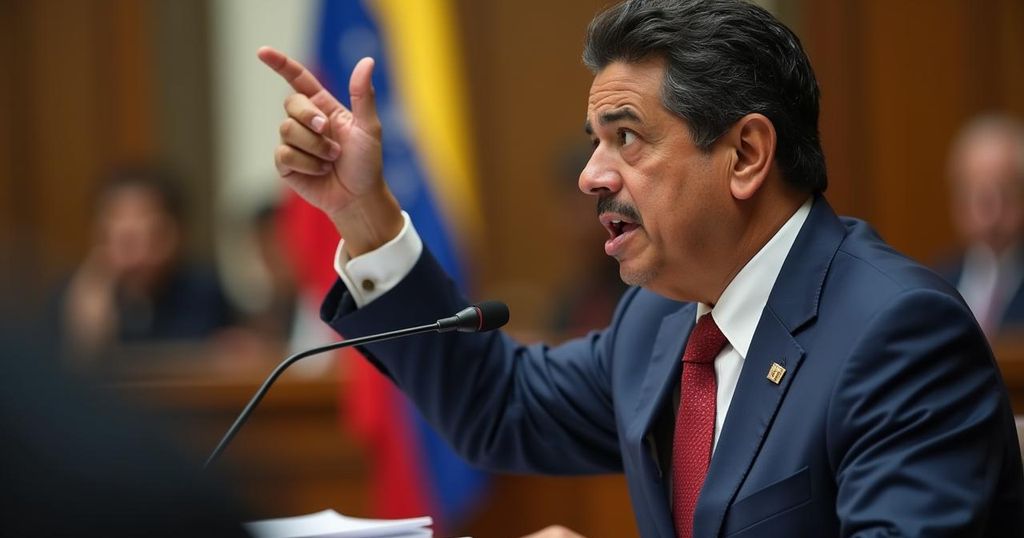Elvis Amoroso, the Venezuelan official who claimed that Nicolás Maduro won the presidential election, has been missing for over ten weeks, raising concerns and fueling rumors about his status. Many speculate he may face detainment by Maduro’s regime due to fears he may defect. The absence comes against a backdrop of international skepticism regarding the election’s legitimacy, with claims that opposition candidate Edmundo González was the true winner. The situation underlines the regime’s oppressive tactics to maintain power and the potential consequences of dissent within its ranks.
Elvis Amoroso, the Venezuelan official responsible for declaring Nicolás Maduro the victor of the disputed presidential election held in July, has not been publicly seen for over ten weeks, prompting widespread speculation regarding his fate. Appointed by Maduro to lead the National Electoral Council, Amoroso was last seen on August 5, 2024, when he presented documents to the Supreme Court that allegedly confirmed Maduro’s claim of receiving nearly 52% of the votes. Opposition members argue that the official tally was fabricated and that the true winner was candidate Edmundo González, who purportedly garnered more than 68%. Most international observers express skepticism regarding the election results that Amoroso announced, with many acknowledging González as the legitimate victor. Current rumors suggest that Amoroso may be detained within the Caracas military facility known as Fuerte Tiuna, allegedly due to his preparations to flee the country. This echoing of past incidents, such as the secretive detention of former oil minister Tareck El Aissami, raises concerns regarding the safety of regime members who may wish to defect. Antonio De La Cruz, president of the think tank Inter American Trends, notes the precarious nature of Amoroso’s position, stating, “This is a guy that the regime can’t allow to leave. What is keeping Maduro in power is Amoroso’s claim that he won, but if he defects and takes that away, Maduro’s claim to legitimacy collapses.” Furthermore, the Venezuelan regime has yet to present official certification of the election results, making Amoroso’s assertions paramount to Maduro’s political standing. Political scientist Jose Vicente Carrasquero emphasizes the potential ramifications of Amoroso coming forward to confess discrepancies, stating, “It would be simply explosive for these people [in the regime] if he was to suddenly appear here in Miami declaring to a television station or to the Miami Herald, ‘I was given a piece of paper to read and that was what I said on the night of the election.’” Amoroso’s absence has garnered significant attention on social media, where initial rumors suggested arrest in Argentina followed by extradition to the United States, though these claims have been discredited. Nonetheless, his inaccessibility raises alarm about the treatment of dissidents in the current repressive climate, with reports indicating that approximately 2,000 protestors have faced arrest, often accompanied by accusations of torture. Ivan Simonovis, the former intelligence chief for opposition leader Juan Guaidó, noted that those privy to sensitive regime information live under constant surveillance, stating, “That is the fate of those who possess the most damaging secrets of the regime, surrounded by what are essentially prison guards.” The uncertainty surrounding Amoroso’s situation exemplifies the heightened tensions in Venezuela amidst ongoing political turmoil and the struggle for power within the regime. The international community continues to scrutinize the validity of the electoral process and the implications of potential defections from within Maduro’s inner circle.
The situation in Venezuela is marked by political unrest and skepticism surrounding electoral processes, particularly after a controversial presidential election. Nicolás Maduro, who has maintained power amid allegations of electoral fraud, appointed Elvis Amoroso as head of the National Electoral Council to ensure compliance with the regime’s narrative of victory. Following the election, significant doubts have emerged regarding the legitimacy of the reported results, with opposition candidates contending they were marginalized. The absence of Amoroso has heightened fears of retribution within a regime that heavily relies on perception and control. This is compounded by international calls for transparency and acknowledgment of human rights violations that have occurred during this political conflict.
Elvis Amoroso’s disappearance serves as a clear indication of the volatile dynamics within Venezuela’s political landscape, particularly under Nicolás Maduro’s regime. The speculation surrounding his status reflects broader concerns about the legitimacy of electoral processes and the lengths to which authoritarian regimes might go to suppress dissent and conceal the truth. In light of increasing international scrutiny and the regime’s history of repressing potential defectors, the ongoing situation emphasizes the complexities of power retention in an environment fraught with distrust and political tension.
Original Source: www.miamiherald.com






